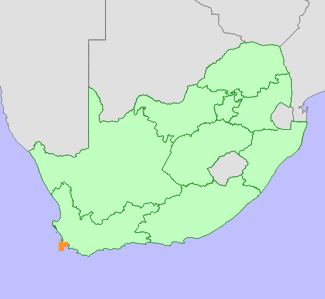|
Scientific Name | Kewa trachysperma (Adamson) Christenh. |
Higher Classification | Dicotyledons |
Family | KEWACEAE |
Synonyms | Hypertelis trachysperma Adamson |
National Status |
Status and Criteria | Endangered B1ab(iii,v)+2ab(iii,v) |
Assessment Date | 2015/04/24 |
Assessor(s) | N.A. Helme, D. Raimondo & L. von Staden |
Justification | A range-restricted local endemic to the Cape Flats and Cape Peninsula, EOO 152 km², AOO <1 km². Plants at one of two known locations continue to decline due to ongoing habitat degradation. |
Distribution |
Endemism | South African endemic |
Provincial distribution | Western Cape |
Range | Cape Flats. |
Habitat and Ecology |
Major system | Freshwater |
Major habitats | Cape Flats Dune Strandveld, Cape Seashore Vegetation |
Description | Coastal mudflats and seasonally waterlogged depressions among coastal dunes. |
Threats |
| Habitat loss and degradation as a result of urban expansion, disruption of wetland dynamics, pollution and eutrophication is likely to have caused the local extinction of this species on the Cape Flats, where it was last collected in 1950. It still occurs on the Cape Peninsula, where it is threatened by ongoing habitat loss and degradation due to urban expansion, competition from unmanaged alien invasive plants, and disruption of wetland water flow. |
Population |
This Cape Flats endemic was thought to be extinct, until a small population was found in the Cape Point section of Table Mountain National Park in 2010. This subpopulation however could not be relocated again in spite of annual surveys. In 2015, a second, larger subpopulation was found further north in Kommetjie, where it is declining due to ongoing habitat loss and degradation.
|
Population trend | Decreasing |
Notes |
| One collection from the Northern Cape currently included under H. trachysperma is possibly a new species. The identification is uncertain and it was not cited in the revision of the genus (Adamson 1958). For this reason it is not included in this assessment. |
Assessment History |
Taxon assessed |
Status and Criteria |
Citation/Red List version | | Kewa trachysperma (Adamson) Christenh. | EN B1ab(iii,v)+2ab(iii,v) | 2015.1 | | Hypertelis trachysperma Adamson | Critically Endangered (Possibly Extinct) | Raimondo et al. (2009) | |
Bibliography |
Adamson, R.S. 1958. The South African species of Aizoaceae. IV. Mollugo, Pharnaceum, Coelanthum and Hypertelis. Journal of South African Botany 24:11-69.
Christenhusz, M.J., Brockington, S.F., Christin, P.-A. and Sage, R.F. 2014. On the disintegration of Molluginaceae: a new genus and family (Kewa, Kewaceae) segregated from Hypertelis, and placement of Macarthuria in Macarthuriaceae. Phytotaxa 181(4):238-242.
Goldblatt, P. and Manning, J.C. 2000. Cape Plants: A conspectus of the Cape Flora of South Africa. Strelitzia 9. National Botanical Institute, Cape Town.
Helme, N.A. and Trinder-Smith, T.H. 2006. The endemic flora of the Cape Peninsula, South Africa. South African Journal of Botany 72(2):205-210.
Raimondo, D., von Staden, L., Foden, W., Victor, J.E., Helme, N.A., Turner, R.C., Kamundi, D.A. and Manyama, P.A. 2009. Red List of South African Plants. Strelitzia 25. South African National Biodiversity Institute, Pretoria.
|
Citation |
| Helme, N.A., Raimondo, D. & von Staden, L. 2015. Kewa trachysperma (Adamson) Christenh. National Assessment: Red List of South African Plants version 2024.1. Accessed on 2026/01/23 |
 Comment on this assessment
Comment on this assessment

